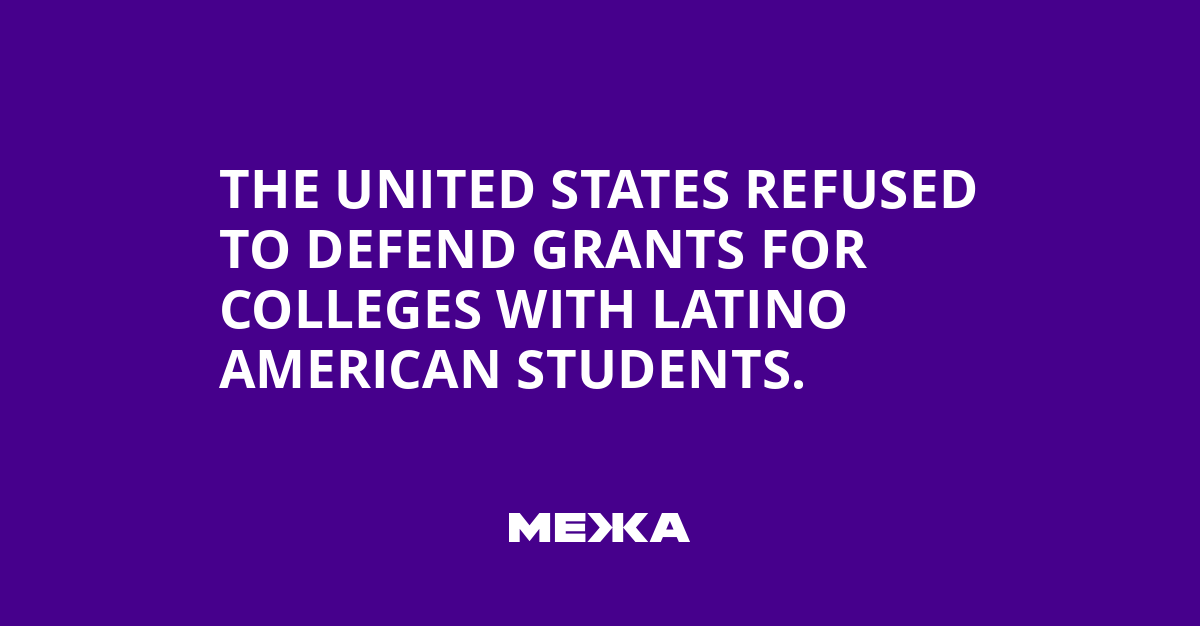In Washington on Friday, the administration said it would not defend the long-standing grants program for colleges with a substantial share of Latino students, which is currently being challenged in court as unconstitutional.
In a memo sent to Congress, the Department of Justice said it agreed with the lawsuit aimed at eliminating the grants designated for institutions where at least a quarter of first-year students are Latino. The program was created in 1998 after the finding that Latino students enter colleges and complete their studies at substantially lower rates than white students.
Legal officials argued that such a program provides an unconstitutional advantage on the basis of race or ethnicity.
In June, Tennessee and the conservative civil rights organization Students for Fair Admissions filed a lawsuit against the U.S. Department of Education, seeking to halt the Hispanic-Serving Institutions (HSIs) program. The plaintiffs contend that their public universities serve Latino students but do not meet the external “arithmetic thresholds” for receiving grants, which could mean millions of dollars in losses.
On Friday, the DOJ released a letter to Speaker of the House Mike Johnson, in which the Attorney General stated that the department had decided not to defend this program, citing that certain provisions are unconstitutional. The letter, dated July 25, references the Supreme Court’s 2023 decision that “open racial balancing” is “clearly unconstitutional”.
The DOJ declined to comment on the case.
Tennessee is backed by the group Students for Fair Admissions, a conservative civil rights organization that previously sued over affirmative action in admissions at Harvard University and the University of North Carolina. This case is linked to the Supreme Court’s 2023 decision that barred considering race in admissions to higher education institutions.
Edward Blum, the head of this group, said on Friday that they would not participate in comments about the case.
More than 500 colleges and universities hold the status of Hispanic-Serving Institutions (HSIs), which allows them to compete for grants. In 2024, Congress allocated about $350 million for the program. The grants can be used for a variety of purposes – from upgrading facilities to supporting scientific programs.
Former President Joe Biden made HSIs a priority, signing last year an executive order that promises to create a new presidential advisory body and increase funding. Donald Trump rescinded this order on his first day in the White House.
The Trump administration has continued to push for reducing diversity, equity, and inclusion policies in the public sector, education, and business, arguing that they discriminate against White and Asian American citizens. Nevertheless, the 2026 budget proposal kept the HSIs grants and even called for a small increase.
“They have decided not to defend the program, stating that certain provisions are unconstitutional.”
– U.S. Department of Justice
The Legal Basis for HSIs and the Position of Professional Associations
Under the rules, any college can obtain HSIs status if its Latino students make up at least 25% of the total enrollment. The list of HSIs includes both leading campuses and many regional and state institutions.
The National Association of HSIs asserts that the grants meet constitutional standards and help level the playing field for its members. According to the association, their schools educate about 67% of the country’s Latino students, but research shows they receive less federal and state funding compared with other institutions.
HSIs are open to students of any race. An oft-cited example is Southern Adventist University in Tennessee – a private institution with 28% Latino students and 40% White.
The Department of Justice is generally required to uphold the Constitution and federal law, but in exceptional cases can decline to defend laws it deems unconstitutional. Similar steps were previously used by the Obama and Trump administrations regarding certain laws.
In the context of the developments, many experts expect that the discussion about the role of HSIs in the U.S. education funding strategy will continue despite the courts’ final decisions.
“Open racial balancing” is “clearly unconstitutional” per the U.S. Supreme Court’s 2023 decision.
– U.S. Supreme Court
In summary, the events surrounding HSIs underscore the complexity of diversity policies in education and their potential impact on future university funding decisions in the United States.

